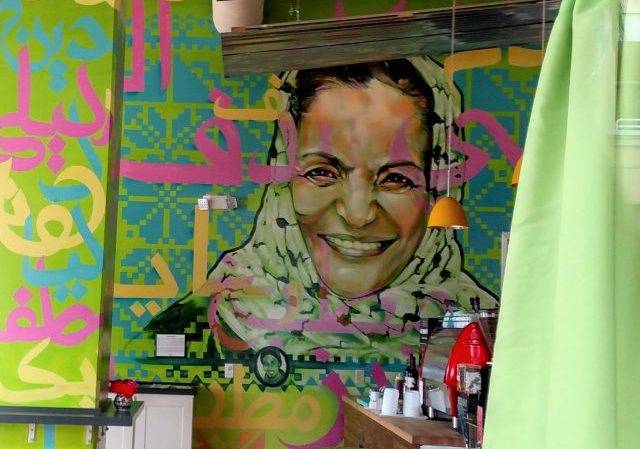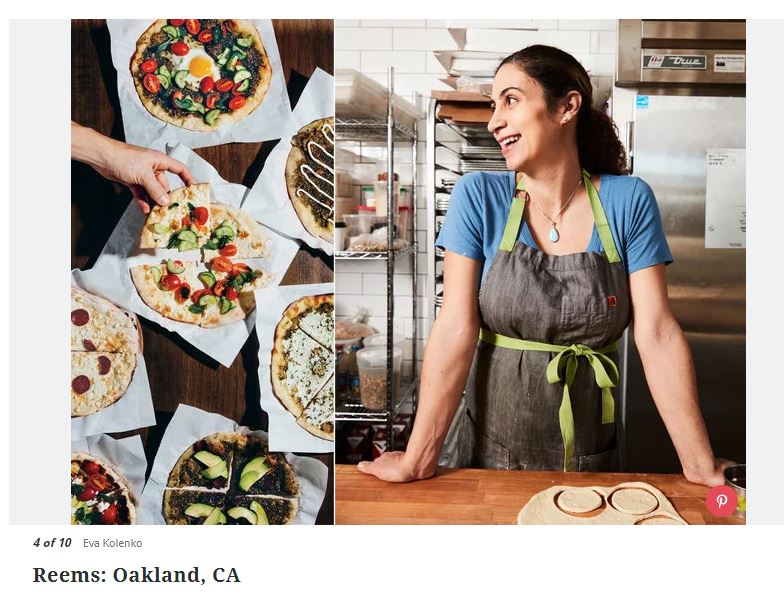Food & Wine mag honors Reem’s Oakland restaurant, ignores wall-sized mural of terrorist

Food & Wine magazine recently released its Restaurants of the Year 2018.
The article, by F&W Restaurant Editor Jordanna Rothman, includes Reem’s of Oakland, CA. In the introduction to the article, Rothman notes: “At Reem’s in Oakland, California, I was moved by Reem Assil, a Syrian and Palestinian chef who uses food to cultivate understanding for the Arab experience in America.”
The review of Reem’s goes far beyond the menu or food preparation, and focuses heavily on the atmosphere at the restaurant. The review states, in part (emphasis added):
Food as a vehicle for healing is at the center of everything here. Assil has roots in the local foods movement of the Bay Area—Reem’s started out as a farmers market stand. And so the produce is local, the meat from nearby halal butchers. The dough for those man’oushe breads gets its tang from a Tartine Bakery starter and may be topped with cumin from Burlap & Barrel, a company emphasizing ethical sourcing in Afghanistan, Palestine, and elsewhere.At a moment when touchstones of Middle Eastern cuisine like tahini and pomegranate molasses appear on menus all over the country, Reem’s offers an opportunity to see those flavors, often attributed to Israel, through a wider lens, one inclusive of the Arab perspective. “I wanted to cultivate understanding in the most humane way possible—through food,” says Assil, who makes her case with orange blossom–scented cookies, spinach pastries spiced with cinnamon and sumac, and warm flatbread bundling sujuk sausage. “I look around my restaurant on a Saturday afternoon. I see Jews and Arabs eating together. I see people who are not politicized just enjoying a meal. And I think, this is what peace looks like.”
In a tweet, Rothman said she was “[s]o moved by this place <3” in response to a food critic quoting the line from the review that “[f]ood as a vehicle for healing is at the center of everything here.”
There is one problem with this Food & Wine narrative of Reem’s as a place of healing and peace.
One very big problem.
A problem so big it takes up an entire wall in Restaurant at Reem’s, right up front in a highly visible place. Reem’s has a wall-sized mural of convicted terrorist killer Rasmea Odeh.
Rasmea masterminded a 1969 supermarket bombing in Jerusalem that killed two Hebrew University students, Edward Joffe and Leon Kanner.[Image via Jerusalem Post, used with permission]
The mural of Rasmea Odeh is central to Reem Assil’s political outlook, which includes a history of anti-Israel activism. The controversy over the mural received widespread publicity, and Assil defended the mural:
For Assil, who is of Palestinian-Syrian descent, “[Odeh] embodies the resilience of Arab women fighting for justice in this country. She is an elder to a lot of us younger women who are activists and want to do right among our community,” said Assil, who compares Odeh to a modern day Malcom X….”
We have documented dozens of times the overwhelming evidence of Rasmea’s participation in the bombing, her prison sentence in Israel and then release in a prisoner exchange, and how Rasmea lied on her visa and naturalization papers to unlawfully gain entry to and citizenship in the U.S. In September 2017, after a guilty plea, Rasmea was deported and stripped of her citizenship.
In her plea deal to immigration fraud, Odeh admitted that the centerpiece of her defense, that she falsely filled out the immigration forms due to PTSD resulting from torture, was not true. Indeed, as we documented, Rasmea’s claim of a torture induced confession was inconsistent with the demonstrable record. You can get an overview of the history in my post and video interview, The Lies of Rasmea Odeh and Her Supporters Exposed:
Rather than creating a place where difficult conversations could be had, owner Reem Assil tried to shut down peaceful protests outside the restaurant:
- Anti-Israel activists try to shut down protests over California bakery honoring Palestinian terrorist
- Reem’s Oakland bakery seeks Ct order halting protests over terrorist mural
- Vigils continue for Rasmea Odeh’s victims outside Reem’s Oakland Bakery despite legal threats
- Reem’s Oakland Bakery Drops Lawsuit to Silence Protests Against Mural of Terrorist Rasmea Odeh
So why wasn’t the celebration of a convicted terrorist murderer mentioned in the Food & Wine article?
I emailed both the author Rothman and Food & Wine’s media relations, but as of this writing have not received a response:
I noticed that you posted a review of Reem’s, and included it on the list of Top Restaurants of the Year, but didn’t mention the large mural of supermarket bomber Rasmea Odeh on the wall. Is there a reason that was not mentioned at all, since you went beyond a straight food review and commented on how Reem “understood food as a potent tool for empathy and connection.” You also quoted her as saying “I see people who are not politicized just enjoying a meal. And I think, this is what peace looks like.” Would seem that if you are presenting Reem’s as a non-political place that promotes understanding, it would be relevant that there is a mural of a convicted murderer on the wall.I’m writing about this for tonight, so if you could respond this afternoon that would be great.
I also tweeted a response to the tweet (above) hearting Reem’s:
It’s not necessary, or even desirable, that restaurant reviews go into the politics of the owner. Politics does not have to infuse every aspect of our lives.
Food & Wine, nonetheless, decided to make Reem Assil’s politics the centerpiece of the review and one of the main reasons Reem’s was put on the prestigious list of Favorite Restaurants 2018. That portrayal, however, was sanitized.
Food & Wine ignored the elephant in the room, or rather, the mural on the wall.
CLICK HERE FOR FULL VERSION OF THIS STORY
